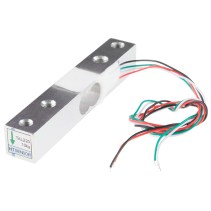Introduction
The original purpose of these weigh scales was to measure the quantity of liquor in the kettle. However with the addition of flow sensors into the system , the scales were re-purposed in an attempt to calculate the alcohol content.
The basis of these scales are simple and cheap load cells.
Load Cell (Datasheet)
Each load cell has 4 wires. Two for the power (red & black) and the green & white are a differential signal from the resistive bridge. In this application the excitation voltage is 5V.

Chassis
Four load cells were mounted into a chassis made from rectangular steel tubing. The load cell was bolted at one end to the chassis and the other end was attached to a foot made from a steel disc.


HX711 AD Weight Sensor (Datasheet)
The signals from all load cells are connected together and sent to the HX711 AD Weight Sensor module. This is a small device containing an amplifier and ADC. It is shielded in a metal box and mounted on a small PCB.

The PCB is wrapped in insulating heat shrink material and placed inside the chassis. The sensitive signal wires from the sensors are wrapped in conducting tape that is earthed to the chassis.

The output of from the ADC is serialized and sent to the RaspPi as Data and Clock. These two signals are connected GPIO pins 7 and 8. The driver on the Pi is responsible for implementing the Hx711 protocol, which essentially requires shifting out 24 bits of data.
The finished scale is hidden from view under a false floor.

Tiles are place directly on top of the scales to blend in the rest of the floor. The fermenter then sits on top of the tiles.
